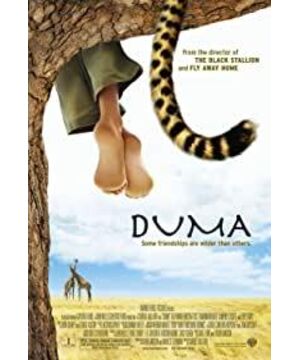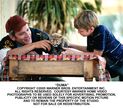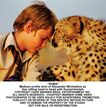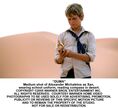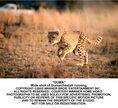In Africa, people say that when you name someone, it becomes your responsibility. The moment the little boy Zane decided to adopt the little cheetah, his father told him clearly, just like the child will leave his parents when he grows up, the little cheetah will return to its world one day, respect its nature, this is also you Responsibility. The mother named the baby cheetah Duma, which means cheetah in Swahili. The Zane family and Duma lived happily on the farm until their father died of illness and their mother was unable to run the farm alone, so they decided to move to the city with Zane. Like many large-scale animal movies and sci-fi movies, wild animals always have various unsuitable conditions in human society, such as Caesar who caused trouble in the neighbor's house in "Rise of the Planet of the Apes" and the huge man in "The Loch Ness Monster". The plesiosaurs eventually had to be released into the wild. Fortunately, "Duma" did not describe this process too complicated and cruel, but put the focus of the story on the process of "return". Despite his reluctance, Zane decided to follow his father's wishes and send Duma back to the place where he met his father and son before he completely lost his wild animal nature. So, in desperation, the young boy rode his father's motorcycle and took Duma across the African continent alone. After several perilous adventures, he and Duma took care of each other and met Rip, a wandering aboriginal friend. Duma, who gradually recovered his wildness, was sent back to the world it originally belonged to.
As a live-action film, the wild animals in the film are very spiritual, and they are no less cute and smarter than any Disney cartoon. The extremely natural and intimate performances of the teenager and the little leopard also make the film more tender. Although such an experience is almost impossible in reality, from the friendship between the juvenile and the cheetah, we can get a little sense of the way we get along with animals in reality: responsibility, which has existed from the moment humans accepted them, this responsibility is not Selfish possession is not to wait for a long time, not to watch them cowardly crawl at their feet, nor to be trapped in a cage to give them food. Wild animals are not poultry pets, and zoos in the human world are not the homes where their ancestors lived for generations. When we take our children to the circus and watch animal performances in the zoo, should we reflect on the purpose of animal protection and simply make fun of human beings? Can the behavior of domesticating wild animals really cultivate children's primitive and normal love for animals?
View more about Duma reviews


